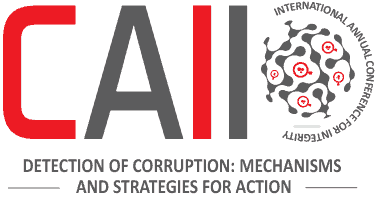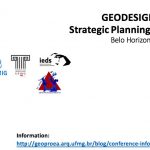Beyond the maps: GIS and Geographic Intelligence in the fight against corruption
Author: Abimael Cereda Junior
Introduction
Today I would like to bring a discussion to this panel of how the Spatial Thinking and the Geotechnologies can help on the fight against corruption, laying the foundations for deterring and detecting corruption cases and the need to be in the core of the theme. So, going beyond maps, looking for Geographic Intelligence, I bring a statement from Microsoft CEO Satya Nadella that “Every business is a digital Business.”
Some of you may be thinking, but I am not a “business”, I am a government, a government agent, a comptroller.
What we are calling business here is business processes, interconnections and connections between different agents.
That is, our work, our management is essentially digital, and we must use information technologies to achieve our goals against the corruption, just as it is our daily life. Just look at this room right now for the participants, using smartphones, smartwatches, apps and including the possibility of people not currently in this place attending from anywhere.
But, we have a particularity, because our business is special and spatial. Because our world is our business.
“Our world is our business”
Any government activity is essentially geographical – territorial. All actions – including outlaws – are eventually territorialized and have a spatial expression or pattern.
So if we are talking about digital business, we have to understand what our business problems are in this extremely complex environment.
And, for that, we can rely on seventeen business issues already listed. The 2030 Agenda, with the Sustainable Development Goals, basically raises seventeen business problems of our world, such as No Poverty, Peace, Justice and Strong Institutions, etc.
And if “Technology is Society and Society cannot be understood or represented without its technological tools” as sociologist Manuel Castells states in his “The Network Society” trilogy, it is not a matter of choosing whether or not to use technologies, but why we are not yet using its full power.
In this context, if every business is digital and our business problems are territorial, we are proposing a new vision, the Government’s 4.0, a Comptroller 4.0.
The Government’s 4.0, a Comptroller 4.0
But why 4.0? Because we are going through the fourth industrial revolution, the first being mechanical steam age, which shrinks the size of our world. The second industrial revolution, bringing “light” to the world and mass production. The third revolution with electronics and Information and Communication Technologies, the technical-scientific-informational age. And now, the fourth Revolution, the Digital Transformation.
And, like every revolution, it brings doubt and uncertainty. But also opportunities: we must bring a new look at our Institutions, revealing processes and models within (wiT͟Hˈin,wiˈTH-) them.
And, as I said, if our business is our world, and our business issues are socio-spatial in the digital age, how can we analyze if contracts are being fulfilled, if the same contractor is performing high complexity works in different locations, what is the network created between contracts and subcontractors? We need to look for technologies that can support such problems. And we can talk right now about Geographic Information Systems.
I’m sure some of you may be scared right now, because you’ve heard about this, and this term always comes with high complexity, high costs, and highly skilled personnel. Like the frightening bigfoot, many say they saw it, but no one really sees results from their actions.
No. What we are proposing here is more than the introduction of a technology platform or similar: it is a cultural change.
Cultural Change
A culture change in which geotechnologies can support the entire audit process, delivering answers to questions from managers, experts, auditors and other agents of this process.
A cultural change whether using GNSS & Positioning, such as GPS, that already impacts the daily lives of our cities, such as Uber and Waze. Either the earth observation platforms, whether satellites or nano-satellites, or even drones, for auditing works, for example, such as the case study conducted at the Guatemalan Comptroller a few months ago.
A culture change with the use of software and algorithms for data analysis, but with its own characteristic: the understanding of spatial relations and patterns. And especially new work processes where we can unite APPs, VR, business models and focus on experience to deliver informational products at the right time, in the right place, in any device.
So, what we are talking about is how we will integrate and deliver insights and analysis in the fight against corruption and embezzlement of public investment. Notice that this head is in scale. That is, we increasingly have urgency in the analysis and, for this, we must dedicate ourselves to understanding and modeling processes, to decide and implement the necessary technologies, bringing changes and, finally, the insights.
Each user level and analyst level will composse – through the use of open data, databases (structured and unstructured), legacy systems and even our spreadsheets – integrations between documents, contracts and others, having Geographic Information Systems as one of the technological supports for this.
This “delivery” of insights, through apps, will allow not only the disclosure of spatial patterns, but also the network of interconnections between contracts, contractors and contracted, for example.
What we are proposing here is the Digital Transformation in a context of geodata-driven corporations, as any government or public manager is in essence, as its decisions and actions at some point and somehow are territorialized.
Smart Communities
More than new software or analytical tools, it is all about smart communities. With administrative efficiency, providing managers and technicians with tools and analysis to assist their work, bringing insights. With transparency in your actions and your data, this does not mean that all data will necessarily be raw accessible, but related to the level of use and permission. With data analysis and information security, allowing to reveal hidden patterns and procedures.
Allowing the democratization of information, whether indoors, breaking down barriers and departments. And also allowing access to the population, media and other agents.
The creation of Geohubs, virtual spaces for the availability, access, creation and manipulation of data in WebGIS environment.
And new forms of Planning, Management and Administrative Actions, allowing new ways to detect corruption, preventing so-called systemic corruption.

Para além dos Mapas: Geotecnologias e Inteligência Geográfica no combate à corrupção




![[CAII 2023]Frenando la corrupción: estrategias colaborativas de investigación y sistemas de sanción 1700582664893](https://geografiadascoisas.com.br/wp-content/uploads/2023/11/1700582664893-150x150.jpeg)
Sobre o autor